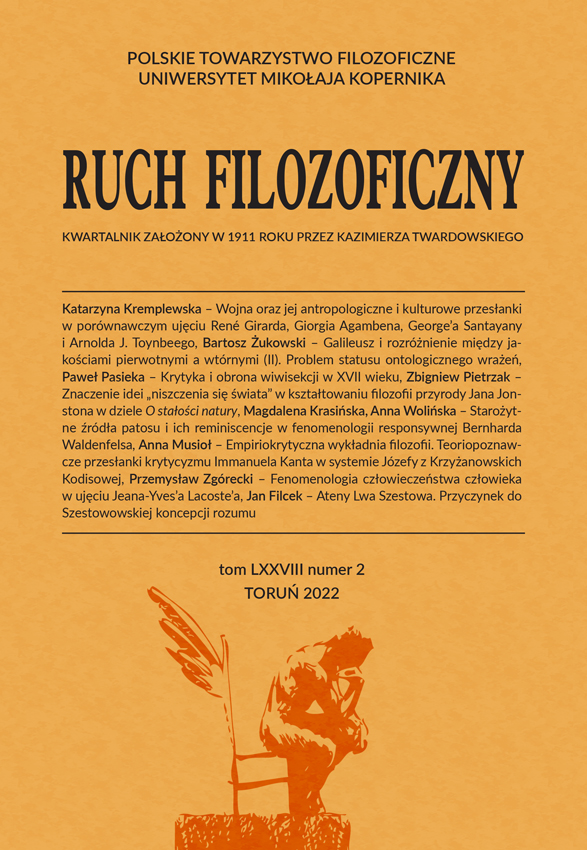Galileusz i rozróżnienie między jakościami pierwotnymi a wtórnymi (II). Problem statusu ontologicznego wrażeń
DOI:
https://doi.org/10.12775/RF.2022.013Abstrakt
Artykuł stanowi kontynuację pracy poświęconej teoretycznej analizie głównego argumentu użytego przez Galileusza do sformułowania rozróżnienia między jakościami pierwotnymi a wtórnymi. Jego przedmiotem jest problem ontologicznego statusu jakości wtórnych/wrażeń. W artykule omawiam trzy główne linie interpretacji tego zagadnienia, rozpatrywane w świetle ustaleń poczynionych w pierwszym tekście. Pierwsza część pracy poświęcona jest mentalistycznej interpretacji Galileuszowych jakości wtórnych. Dociekania te uzupełnia analiza mechanistycznych przesłanek jego koncepcji, za sprawą których zasługuje ona na miano „śmieciowej teorii sensorium”. W części drugiej, analizuję argumenty na rzecz materialistycznej interpretacji jakości wtórnych oraz, posiłkując się wynikami uzyskanymi w pierwszym artykule, wskazuję związane z nią trudności teoretyczne. W trzeciej części pracy, omawiam hermeneutyczne zalety i teoretyczne wady wykładni Galileuszowych jakości wtórnych w kategoriach arystotelesowskich. Artykuł konkluduję uwagami na temat tekstualnego podłoża i historycznego znaczenia ujawnionych trudności interpretacyjnych.
Bibliografia
Ablondi Fred. 2016. Reading Nature’s Book: Galileo and the Birth of Modern Philosophy. New York: Peter Lang.
Ben-Yami Hanoch. 2015. Descartes’ Philosophical Revolution: A Reassessment. Basingstoke: Palgrave Macmillan.
Burtt Edwin A. 1932. The Metaphysical Foundations of Modern Science. London: Kegan, Trench, Trubner, 2nd rev. ed.
Butts Robert E. 1978. „Some Tactics in Galileo’s Propaganda for the Mathematization of Scientific Experience”. W: New Perspectives on Galileo, red. Robert E. Butts, Joseph C. Pitt, 59–85. Dordrecht: D. Reidel.
Buyse Filip. 2015. „The Distinction between Primary Properties and Secondary Qualities in Galileo Galilei’s Natural Philosophy”. Cahiers du Séminaire québécois en philosophie modern / Working Papers of the Quebec Seminar in Early Modern Philosophy 1: 20–45.
Descartes René. 2001. Zasady filozofii, przeł. Izydora Dąmbska. Kęty: Antyk.
Drake Stillman. 1967. „Galileo Galilei”. W: The Encyclopedia of Philosophy, red. Paul Edwards, t. 3, 262–267. New York: Macmillan.
Drake Stillman. 1978. Galileo at Work: His Scientific Biography. Chicago: The University of Chicago Press.
Fischer Eugen. 2009. „Philosophical Pictures and Secondary Qualities”. Synthese 171(1): 77–110.
Galilei Galileo. 1623. Il Saggiatore. Roma: Giacomo Mascardi.
Galilei Galileo. 1960. The Assayer. W: The Controversy on the Comets of 1618, przeł. Stillman Drake, C. D. O’Malley, 151–336. Philadelphia: University of Pennsylvania Press.
Galilei Galileo. 2008. „From The Assayer (1623)”. W: Galileo Galilei, The Essential Galileo, red. i przeł. Maurice A. Finocchiaro, 179–189. Indianapolis: Hackett.
Galilei Galileo. 2009. Waga probiercza, przeł. Agnieszka Maciąg, Tadeusz Sierotowicz. Kraków–Tarnów: Biblos.
Galilei Galileo. 2012. „From The Assayer”, przeł. Mark Davie. W: Galileo Galilei, Selected Writings, przeł. William R. Shea, Mark Davie, 115–121. Oxford: Oxford University Press.
Gilbert Neal W. 1963. „Galileo and the School of Padua”. Journal of the History of Philosophy 1(2): 223–231.
Hacker Peter M. S. 1986. „Are Secondary Qualities Relative?”. Mind. New Series 95(378): 180–197.
Heilbron John L. 2010. Galileo. Oxford: Oxford University Press.
Locke John. 1955. Rozważania dotyczące rozumu ludzkiego, przeł. Bolesław J. Gawecki, t. 1. Kraków: PWN.
LoLordo Antonia. 2011. „Gassendi and the Seventeenth-Century Atomists on Primary and Secondary Qualities”. W: Primary and Secondary Qualities: The Historical and Ongoing Debate, red. Lawrence Nolan, 62–80. Oxford: Oxford University Press.
Martinez Julio A. 1974. „Galileo on Primary and Secondary Qualities”. Journal of the History of the Behavioral Sciences 10(2): 160–169.
Mittelstrass Jürgen. 1967. „Remarks on Nominalistic Roots of Modern Science”. Organon 4: 39–46.
Nolan Lawrence, John Whipple. 2006. „The Dustbin Theory of Mind: A Cartesian Legacy?”. W: Oxford Studies in Early Modern Philosophy, red. Daniel Garber, Steven Nadler, t. 3, 33–55. Oxford: Clarendon Press.
O’Toole Frederick J. 1974. „Qualities and Powers in the Corpuscular Philosophy of Robert Boyle”. Journal of the History of Philosophy 12(3): 295–315.
Pasnau Robert. 2011. Metaphysical Themes 1274–1671. Oxford: Clarendon Press.
Pasnau Robert. 2011. „Scholastic Qualities, Primary and Secondary”. W: Primary and Secondary Qualities: The Historical and Ongoing Debate, red. Lawrence Nolan, 41–61. Oxford: Oxford University Press.
Piccolino Marco, Nicholas J. Wade. 2014. Galileo’s Visions: Piercing the Spheres of the Heavens by Eye and Mind. Oxford: Oxford University Press.
Randall John H. 1940. „The Development of Scientific Method in the School of Padua”. Journal of the History of Ideas 1(2): 177–206.
Rickless Samuel C. 2018. „Qualities”. W: The Routledge Companion to Seventeenth Century Philosophy, red. Dan Kaufmann, 60–86. London: Routledge.
Rotter Krzysztof. 1992. „Fizyka Galileusza a arystotelizm. Przyczynek do roli krytyki w rozwoju wiedzy”. Nowa Krytyka 2: 31–51.
Żukowski Bartosz. 2022. „Galileusz i rozróżnienie między jakościami pierwotnymi a wtórnymi (I). Argument superesencjalistyczny”. Ruch Filozoficzny 78(1): 25–49.
Pobrania
Opublikowane
Jak cytować
Numer
Dział
Licencja
Prawa autorskie (c) 2022 Bartosz Żukowski

Utwór dostępny jest na licencji Creative Commons Uznanie autorstwa – Bez utworów zależnych 4.0 Międzynarodowe.
Statystyki
Liczba wyświetleń i pobrań: 530
Liczba cytowań: 0



